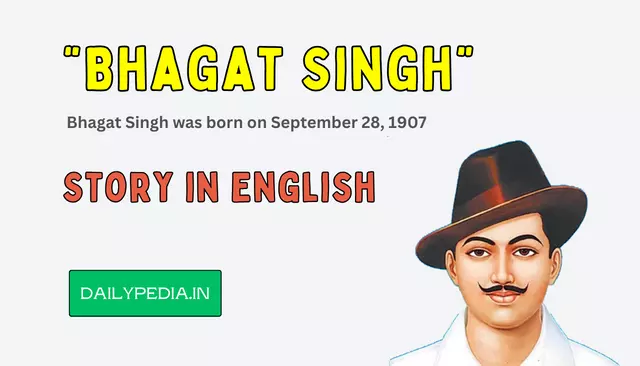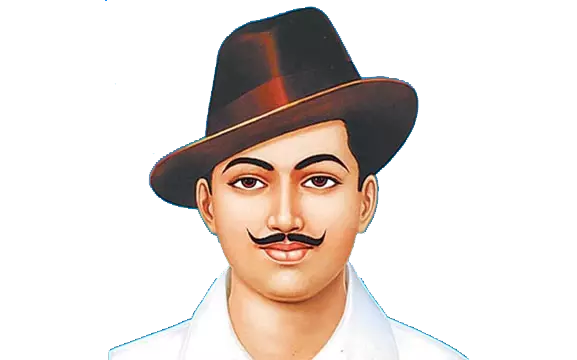Discover the inspiring story of Bhagat Singh, a fearless Indian revolutionary who played a pivotal role in the fight for India’s independence against British colonial rule. Learn about his early life, activism, sacrifices, and enduring legacy as a symbol of courage and patriotism.
Bhagat Singh Story in English

Bhagat Singh was a prominent Indian revolutionary who played a significant role in the Indian independence movement against British colonial rule. Here is the story of Bhagat Singh in English:
Bhagat Singh Early Life:
Bhagat Singh was born on September 28, 1907, in a small village called Banga in the Punjab region of British India, which is now part of Pakistan. He came from a family of freedom fighters, and his father, Kishan Singh Sandhu, and uncle, Ajit Singh, were actively involved in the struggle for India’s independence. Bhagat Singh was deeply influenced by his family’s patriotic values from a young age.
Bhagat Singh Jallianwala Bagh Massacre:
One of the incidents that had a profound impact on Bhagat Singh’s life was the Jallianwala Bagh massacre in 1919, where British troops under the command of General Dyer opened fire on a peaceful gathering in Amritsar, killing hundreds of unarmed civilians. This brutal act of violence fueled the fire of nationalism in young Bhagat Singh.
Bhagat Singh Entry into the Freedom Movement:
Bhagat Singh became actively involved in the struggle for India’s independence during his teenage years. He joined the Hindustan Socialist Republican Association (HSRA), a revolutionary organization committed to achieving India’s freedom through armed resistance.
Bhagat Singh The Assembly Bombing:
On April 8, 1929, Bhagat Singh and Batukeshwar Dutt threw non-lethal smoke bombs in the Central Legislative Assembly in Delhi to protest against repressive laws. Their intention was to use the trial as a platform to raise awareness about the demand for complete independence.
Bhagat Singh Hunger Strike in Jail:
While in jail, Bhagat Singh and other inmates protested against the inhumane treatment of political prisoners by going on a hunger strike. The strike lasted for 116 days and gained nationwide attention, putting pressure on the British authorities to improve the conditions of prisoners.
Bhagat Singh Execution:
Despite international appeals for clemency, Bhagat Singh, along with Rajguru and Sukhdev, was sentenced to death for his involvement in the murder of John Saunders, a British police officer, in connection with the Lahore Conspiracy Case. On March 23, 1931, at the young age of 23, Bhagat Singh, along with his comrades, was executed by hanging in Lahore Central Jail. Their sacrifice inspired countless others in the struggle for India’s independence.
Bhagat Singh Legacy:
Bhagat Singh is remembered as a fearless and dedicated patriot who was willing to sacrifice his life for the cause of India’s freedom. His actions and words continue to inspire generations of Indians to stand up for justice, equality, and the ideals of a free and independent India. He is often referred to as “Shaheed Bhagat Singh,” with “Shaheed” meaning “martyr” in Hindi, to honor his sacrifice for the nation. Bhagat Singh’s legacy remains a symbol of courage and unwavering commitment to the principles of liberty and justice.

10 Lines On Bhagat Singh
- Bhagat Singh, born in 1907, was a prominent Indian revolutionary.
- He joined the fight for India’s independence from British colonial rule.
- Bhagat Singh was deeply influenced by the Jallianwala Bagh massacre.
- He became a member of the Hindustan Socialist Republican Association.
- Bhagat Singh and Batukeshwar Dutt staged a protest by throwing non-lethal smoke bombs in the Central Legislative Assembly.
- He went on a 116-day hunger strike in jail to protest against the treatment of political prisoners.
- Bhagat Singh, along with Rajguru and Sukhdev, was sentenced to death for their involvement in the murder of a British police officer.
- On March 23, 1931, he was executed by hanging in Lahore Central Jail.
- His sacrifice continues to inspire generations in the quest for justice and freedom.
- Bhagat Singh is remembered as a national hero and martyr in India’s struggle for independence.
Few Lines on Bhagat Singh in English for Students
Bhagat Singh was a brave Indian freedom fighter.
Bhagat Singh Story in English
He was born in 1907 and grew up in a family of patriots.
Bhagat Singh Story in English
Inspired by the Jallianwala Bagh massacre, he joined the fight for India’s independence.
Bhagat Singh Story in English
Bhagat Singh is known for his daring protest in the Central Legislative Assembly.
Bhagat Singh Story in English
He went on a long hunger strike in jail to protest against the ill-treatment of political prisoners.
Bhagat Singh Story in English
Sadly, he was executed by the British at a young age, but his sacrifice continues to inspire us.
Bhagat Singh Story in English
Bhagat Singh’s legacy teaches us the value of courage and love for our country.
Bhagat Singh Story in English
He remains a symbol of patriotism and a hero for students and Indians alike.
Bhagat Singh Story in English
Remembering his dedication and sacrifice is important for our nation’s history.
Bhagat Singh Story in English
Also Read-
Mahatma Gandhi Story in English
Share With Your Friends